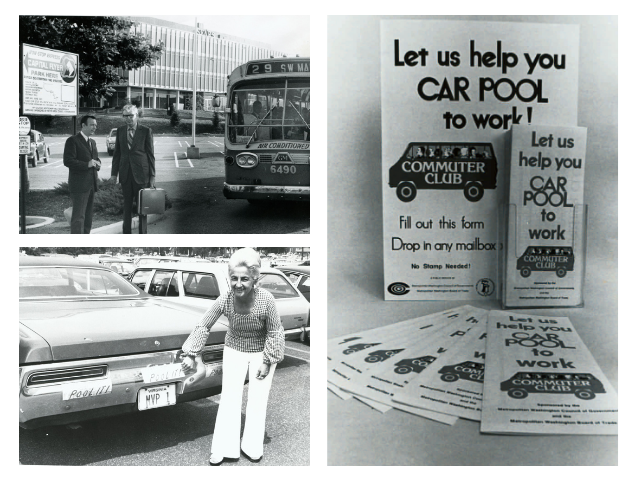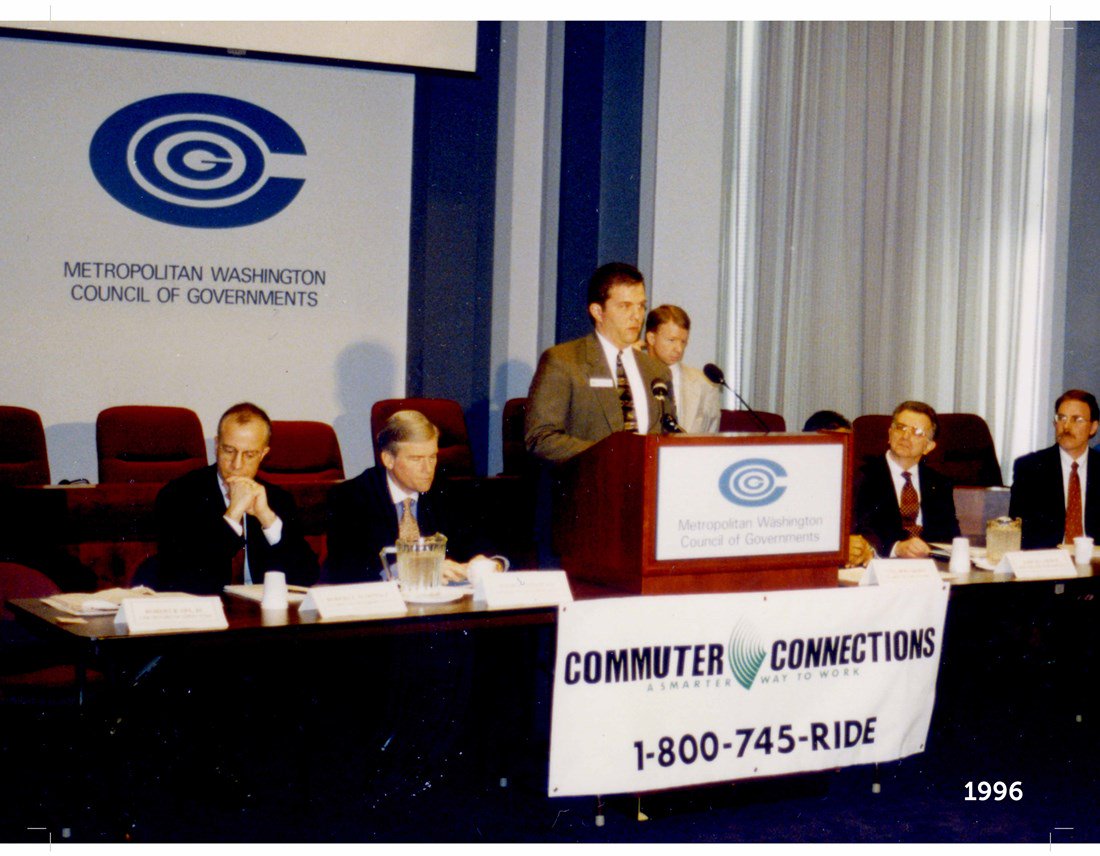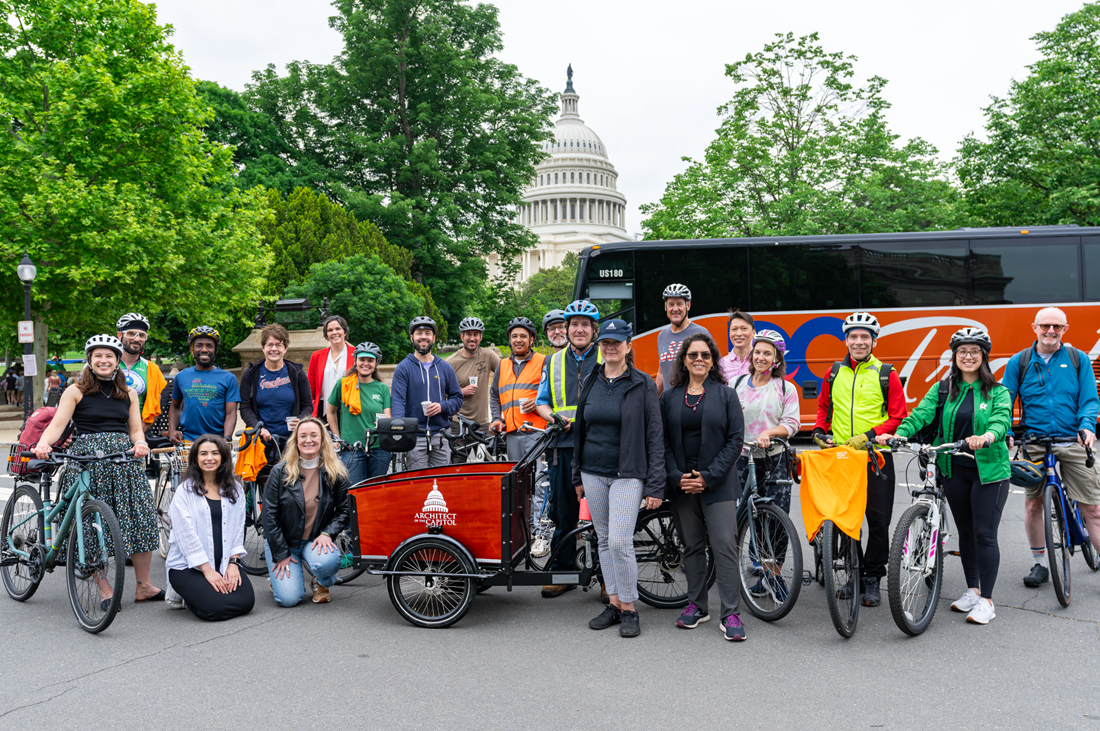For 50 years, Commuter Connections has served a vital role in metropolitan Washington, encouraging community members to make smarter commuting choices through a variety of programs and strategies aimed at reducing the number of people driving alone to work. Initially launched as Commuter Club offering free ridematching services, the regional network – now known across the DMV thanks to its support in providing commuter services, robust marketing and outreach campaigns, and strong track record – has steadily grown and adapted to meet the evolving needs of area commuters. Commuter Connections is a program of the National Capital Region Transportation Planning Board (TPB) at the Metropolitan Washington Council of Governments (COG) and is funded by the District of Columbia, Maryland, and Virginia Departments of Transportation as well as the U.S. Department of Transportation.
In the 1950s and 1960s, an expanding federal government and strong economy led to booming housing and job growth across the region, which also resulted in traffic and air pollution becoming major challenges. During this time period, COG and the TPB were active in supporting plans for a new regional transit system, Metro, as well as helping to launch express bus service from the suburbs to job centers. But it wasn’t until the oil embargo of 1973 that the region joined together to create a comprehensive program to serve area commuters.
With gasoline prices escalating and long lines forming at gas stations as fuel supplies dwindled, officials launched the region’s first-ever carpool matching service in 1974, known as Commuter Club. The service, initially a partnership of COG and the TPB, along with the General Services Administration and Greater Washington Board of Trade, used early computing technology to help people who normally drove to work find or form carpools, saving money on fuel costs and conserving energy.

Clockwise from top left: In 1969, U.S. Congressman Gilbert Gude and Montgomery County Council Member Richard Keeney attend opening of Capital Flyer express bus service, coordinated by COG and TPB; 1970s Commuter Club brochure; Martha Pennino, of the Fairfax County Board of Supervisors, was an early supporter of the Commuter Club.
With the formation of Commuter Club, carpooling and vanpooling became an easy alternative to driving alone, and in the 1980s, the program expanded as COG member jurisdictions were attracted to the ridematching model, including Fairfax, Montgomery, and Prince William Counties and the City of Alexandria. The program acquired a new on-site processing computer and established a new dial-up network with connections between local ridesharing agencies to help speed the return of ridematch results to commuters. In the late 1980s, Commuter Club changed its name to Ride Finders, reintroducing itself to the 3.6 million residents of the metropolitan Washington region.
As new tools became accessible in the 1990s, Ride Finders began to use GIS mapping tools to match potential carpool partners and launched a new website to allow commuters to access ridematching and other information remotely. Ride Finders continued to grow and gained new members, including all local governments in the metropolitan Washington region, several federal and transportation agencies, and governments from as far as Baltimore and Southern Maryland. At the time, this work was also catalyzed by the federal government encouraging the use of transit and vanpools through IRS section 132(f), a federal tax subsidy.

Former Commuter Connections Director Nicholas Ramfos announces rebranding and expansion of the program.
By 1996, after steady growth with support from local jurisdictions, Ride Finders was rebranded as Commuter Connections, reflecting the program’s growing portfolio beyond carpool ridematching to include regional assistance and information on transit, bicycling, and telework. For example, Commuter Connections collaborated with various regional employers, including American University and Freddie Mac, to help them adopt commuter-friendly policies that would maximize employee productivity like flexible work schedules. This expanded portfolio also included sharing information on vanpooling, park-and-ride lots, and the Guaranteed Ride Home Program, Commuter Connections’ signature service providing commuters who regularly carpool, vanpool, bike, walk or take transit to work with a free and reliable ride home when one of life’s unexpected emergencies arises. In 1998, Commuter Connections held its first Employer Recognition Awards, honoring employers in the region that offered outstanding commuter and telework benefits.
 2024 Bike to Work Day
2024 Bike to Work Day
In the 2000s, Commuter Connections partnered with the Washington Area Bicyclist Association (WABA) for its first-ever regional Bike to Work Day, which has grown from 1,100 registrants in 2001 to 14,000 in 2024. It didn’t stop there — Commuter Connections continued to promote alternative commuting options through Car Free Day, encouraging residents to take the pledge and go car-free or car-lite on International Car Free Day.
In the late 2010s, there was an even greater focus on harnessing technology to promote sustainable transportation options, such as a new multimodal trip planning app called incenTrip, developed in partnership with the University of Maryland. The incenTrip app allows commuters to make optimal travel decisions while earning reward points that can be redeemed for cash from Commuter Connections. It continues to be a major success, with nearly 5,000 commuters taking advantage of the app and its rewards.
Commuter Connections also launched ‘Pool Rewards, which offered a limited cash incentive to try carpooling over a 90-day period. After two years, it expanded to include monthly vanpool subsidies. Currently, the maximum incentive for the 90-day reporting period is $130 for ‘Pool Rewards. In addition, Commuter Connections introduced Flextime Rewards, providing heavy-traffic congestion notifications to commuters and cash rewards for delayed commutes along key bottlenecks.
In 2020, the COVID-19 pandemic significantly disrupted commuting patterns, leading to an explosion of teleworking across the DMV region. These changes in commuting trends were documented in Commuter Connections triennial State of the Commute Survey 2022 report, which garnered widespread interest from elected officials, transportation planners, and the local media.
In this new era, Commuter Connections' role in the region continues to evolve, and the program is offering fresh incentives designed to attract a new generation of commuters, especially as more workers return to the office. With assistance from a federal grant, incenTrip will be rebranded as CommuterCash and will engage commuters with real-time sustainable travel through gamification and meaningful rewards. In addition, Commuter Connections received a second federal grant to develop a flexible vanpooling program, VanHoppr, to restore under-capacity vans due to post-pandemic hybrid work schedules.
Over the past five decades, Commuter Connections has adapted while maintaining its core mission: offering commuters smarter ways to get to work, while reducing traffic congestion and emissions. In doing so, the program continues to enhance the quality of life of every resident in the region, even those who haven’t taken advantage of its free services yet.
MORE:
Commuter Connections 50th Anniversary Brochure
Commuter Connections Website